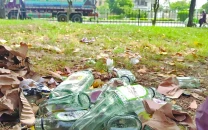IMF proposes reviving 18% GST on petrol
There is also a proposal to gradually increase excise duty on luxury items produced in Pakistan

The International Monetary Fund (IMF) has recommended reinstating an 18% general sales tax (GST) on petrol during the ongoing discussions with the government for the release of the last tranche of its bailout package.
According to Express News, the IMF has proposed increasing the levy on petrol by Rs60 and reinstating the 18% GST previously abolished in March 2022.
The amount of federal excise duty on petroleum products in the fiscal year 2023 was 0.7% of the GDP, while for other items, it was 0.4% of the GDP, mainly obtained from the federal excise duty on cigarettes.
The Petroleum Development Levy has undergone several changes in recent years, but there was a significant increase in it in fiscal year 2023.
In July 2022, the rate of petroleum levy on petrol was Rs20 per liter, which was increased to Rs50 per liter from November 2022, and further raised to Rs60 per liter until September 2023.
Whether local or international projects, the IMF has proposed imposing the Petroleum Development Levy on machinery that pollutes the environment.
It has been proposed to gradually increase excise duty on luxury items produced in the country, such as yachts, while enhancing border control. This is aimed at preventing the illegal supply of petroleum byproducts from sensitive areas in particular.
According to reports, an increase in federal excise duty (FED) at a uniform rate on domestically manufactured cigarettes has been recommended by the IMF. There is also a proposal to apply the same tax rate to imported cigarettes as local cigarettes.



















COMMENTS
Comments are moderated and generally will be posted if they are on-topic and not abusive.
For more information, please see our Comments FAQ